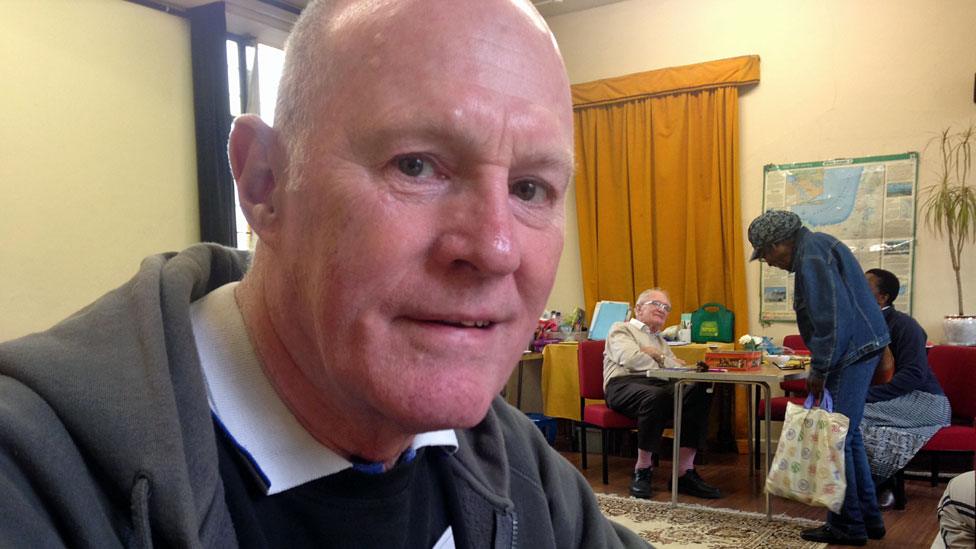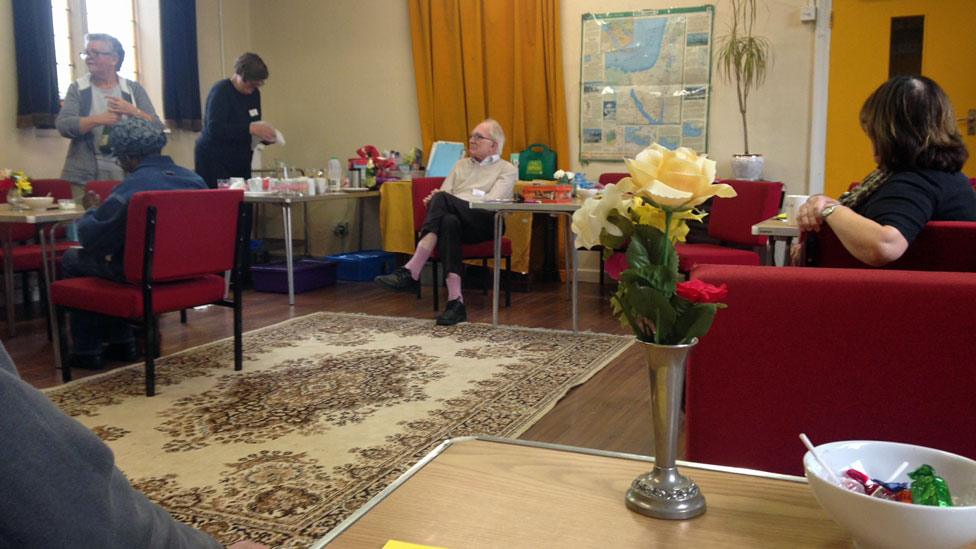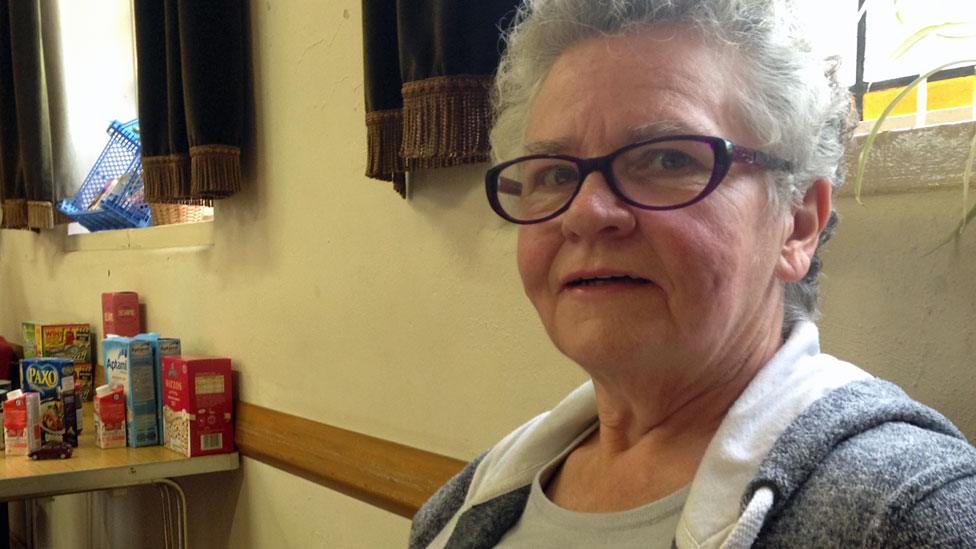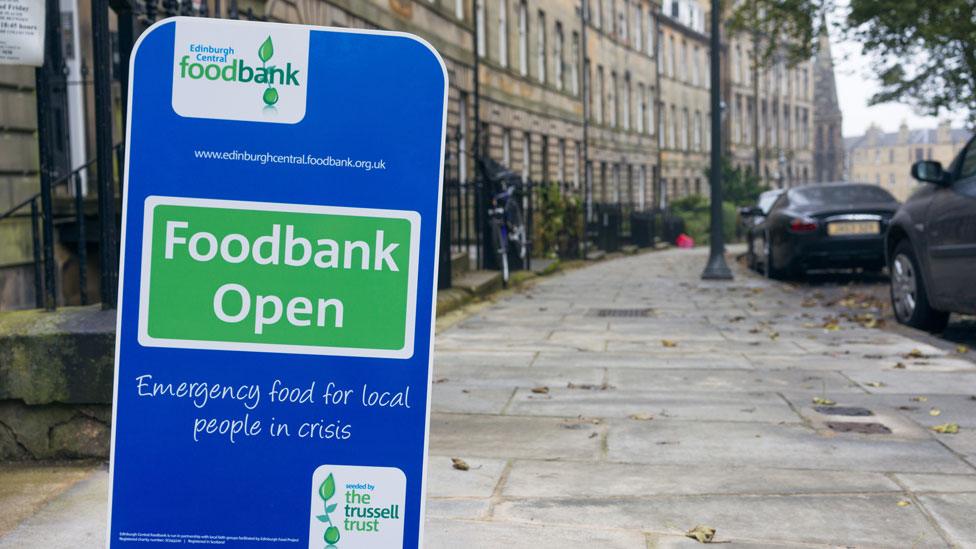Working hard and going backwards
- Published

Brian Morris is a volunteer in a food bank, which now has to help people who are working
Travelling to work can be grim enough at the best of times - but imagine if you got there and were told there was no work and you had to go home again without getting paid.
That is the kind of experience described by workers trying to keep afloat in a job market of casual jobs, agency work and zero-hour contracts.
Simon - not his real name - is in his mid-40s, living near Glasgow, and does not claim any benefits. He wants to rely on his own efforts and hard work.
When the government's spending plans are presented in the Autumn Statement on Wednesday, there could be help for such working families, described by Theresa May as "just getting by" or "just about managing".
Work has always been seen as the route out of poverty - but what happens if work is so unpredictable or so badly paid that it leaves people feeling like they are still going backwards?
'Difficult to talk about'
The world described by Simon seems more like financial quicksand, where people seem to get in deeper difficulty the more they try to get away.
Working in jobs such as catering and hospitality, he has no job security or guarantee of hours, and his working days can vary each week and be cut at short notice.

Oxfam says many families are in poverty, despite having a parent who is working
If he gets a full week's work, then there is money for the bills. But the hours can suddenly be cut, so that he might have only 10 or 12 hours' earnings for the week.
"It's difficult to talk about. It sounds like you're telling a sad story," he says.
But the money he makes has to pay his rent on a one-bedroom flat, and that means he might have to do without everything else.
He says that some days he might have only dry cereal to eat.
When his daughter stays, he sleeps on the sofa so that she can have the bed.
But he says that in 12 years he has never been able to take her on holiday.
'We make our own time. We want a happy home, so we accept these things," he says.

You can join the debate at the BBC's Family & Education News Facebook page, external.
There's also a Reality Check on how many people are using food banks.

But what does this say about the changing world of work? And what does it do to the people caught up in this precarious cycle, where bills come round regularly, but pay day does not?
Work has always been more than work - it has been about dignity and status, a shared endeavour and a sense of making progress.
'Lack of worth'
But that does not really apply when, as Simon describes, he can receive a text message at 10.30pm telling him not to bother coming in the next day. Or when he catches a train out to a job only to be turned back on arrival because he is no longer needed.
"You feel a lack of worth, for sure," he says.

The pressure on income comes alongside high rents
But Simon does not blame the managers, who themselves have little control over a system designed to avoid paying for staff when work is quiet.
"I get how it happens - because they're dictated to by their businesses. The problem is that they're allowed to do it," he says.
"People have become an absolute commodity."
Food banks
Being in work and in poverty at the same time has become increasingly common, says Graham Whitham, Oxfam's senior policy adviser.
"It is unacceptable that over half of all people living in poverty in the UK are in homes where at least one person is working.
"Insecure contracts, persistently low wages and soaring housing costs mean many workers face a monthly struggle to feed their families and pay bills."

The food bank tries to create a place where people can talk
The voluntary sector is also helping to bridge this pay gap.
The food bank in Greenford Methodist Church, in west London, has set up sessions at weekends to help people who are working.
Paying off debts
Volunteer Brian Morris says it will help those who might have work one week and nothing the next.
Bernadette Abi-Karam, another helper at the food bank, says families on low incomes often end up in debt or arrears and while they are trying to "play catch up... it is often the food that suffers".

Bernadette Abi-Karam says helping in the food bank has been an "eye-opener"
The food bank tries to be a homely setting, with tea and chat trying to smooth off the sharper edges of why people are really dropping in.
Mr Morris says they see people pacing around outside, trying to overcome the embarrassment of stepping inside.
He says that as well as providing basic rations of food, the food bank can help with the huge sense of loneliness that can come with financial pressures.
And once they come inside, first-time visitors sometimes "sob their heart out".
Sleeping in cars
"A lot of people won't admit they're struggling," he says.
And the elderly are particularly resistant to admitting they need help.
Ms Abi-Karam says helping in the food bank has been "such an eye opener".

Food banks are finding demand from people whose jobs do not pay enough
There were people who thought there was no need for a food bank in a borough such as Ealing, she says.
But helping there has taken away any idea that "they are a load of scroungers".
Many of those who need food are people with no savings or who have been stuck in debt and suddenly got into difficulty - losing their job or getting ill and being unable to work.
And there is a strong sense of parallel worlds that have become invisible to one another.
A suburban semi-detached house in Ealing can cost a million pounds.
But Mr Morris and Ms Abi-Karam talk about people coming to the food bank who spend their nights sleeping in cars.
"It's shame we have to do this - but it's the way that society has gone," says Mr Morris.
"Helping your neighbour has just disappeared.
"People's lives are so busy. They don't see what's going on under their noses."